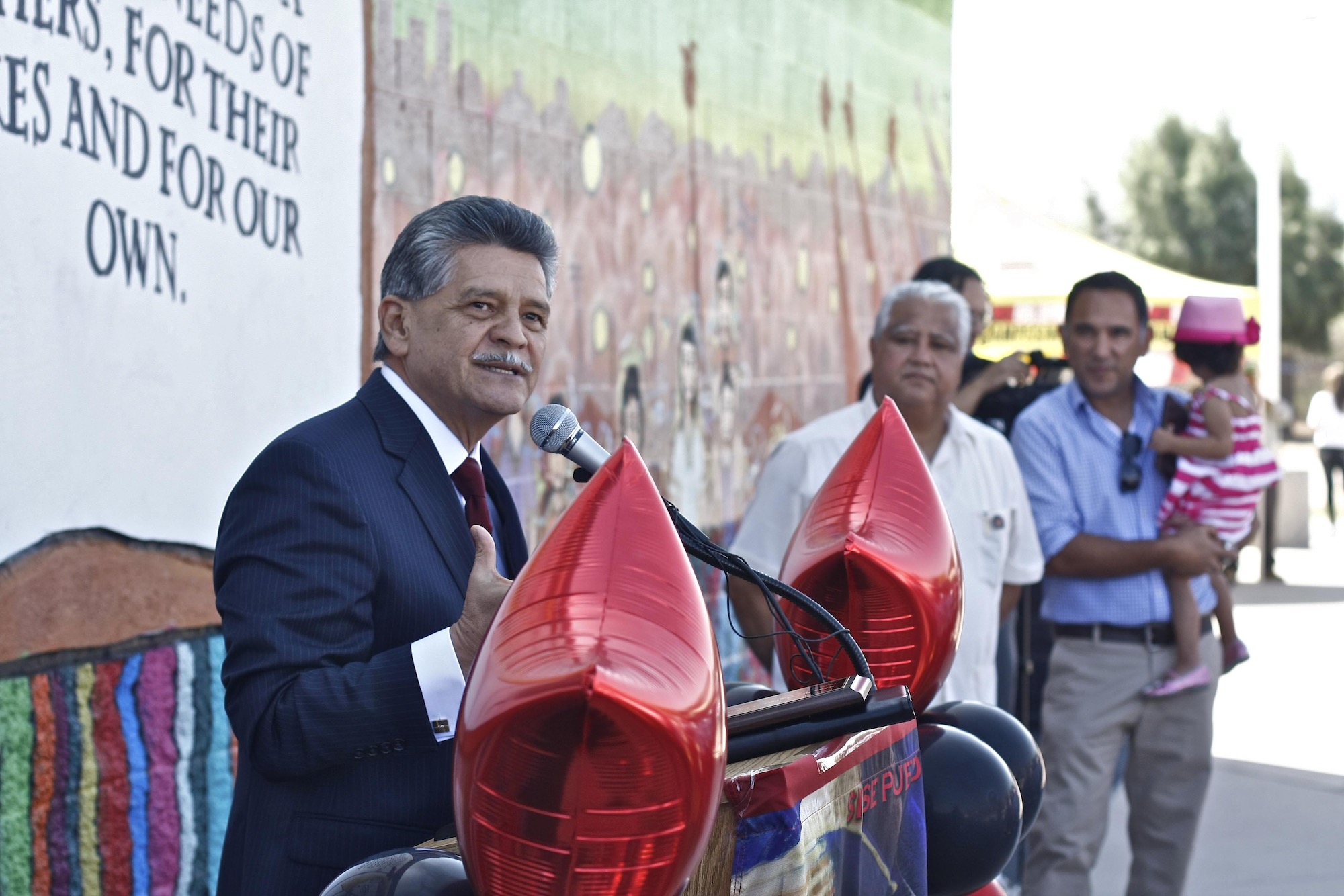Tommy Espinoza took a few college courses during his life but never completed a degree. Yet decades of practical education in giving back to the community has earned him an honorary doctorate from The Catholic University of America.
A recipient of a Doctor of Humane Letters, honoris causa, Espinoza joins the ranks of St. Katharine Drexel (1939), St. Mother Teresa of Calcutta (1971), Ven. Archbishop Fulton J. Sheen (1975), Ven. Cardinal Stefan Wyszyński (1966) and Servant of God Hans Urs von Balthasar (1980).
Other notable recipients include:
- Joseph Kennedy (1939), father of President John F. Kennedy and patriarch of the Kennedy political family;
- World War II hero and President Dwight D. Eisenhower (1953);
- Theodore M. Hesburgh (1969), the president of Notre Dame University who famously locked arms with Rev. Dr. Martin Luther King, Jr.;
- Robert Casey (1988), the Catholic pro-life Democrat governor of Pennsylvania who famously challenged his party’s increasing support of abortion in the early 1990s, including battling Planned Parenthood at the U.S. Supreme Court;
- Carl A. Anderson (2008), the outgoing Supreme Knight of the Knights of Columbus; and
- Fellow Arizonan Michael Bidwill (2015), owner of the Arizona Cardinals.
Espinoza, who serves as the president and CEO of the Raza Development Fund, recalled that when CUA president John Garvey called to give him the news, the latter laughed, telling him, “You just jumped over all that stuff you would have had to have done, and there’s no higher.”
“The honor was great, but the fact that I was receiving it from the Catholic University of America under the bishops and the Vatican, that touched my heart in a different manner because we all try to live our faith at the end of the day,” Espinoza reflected.
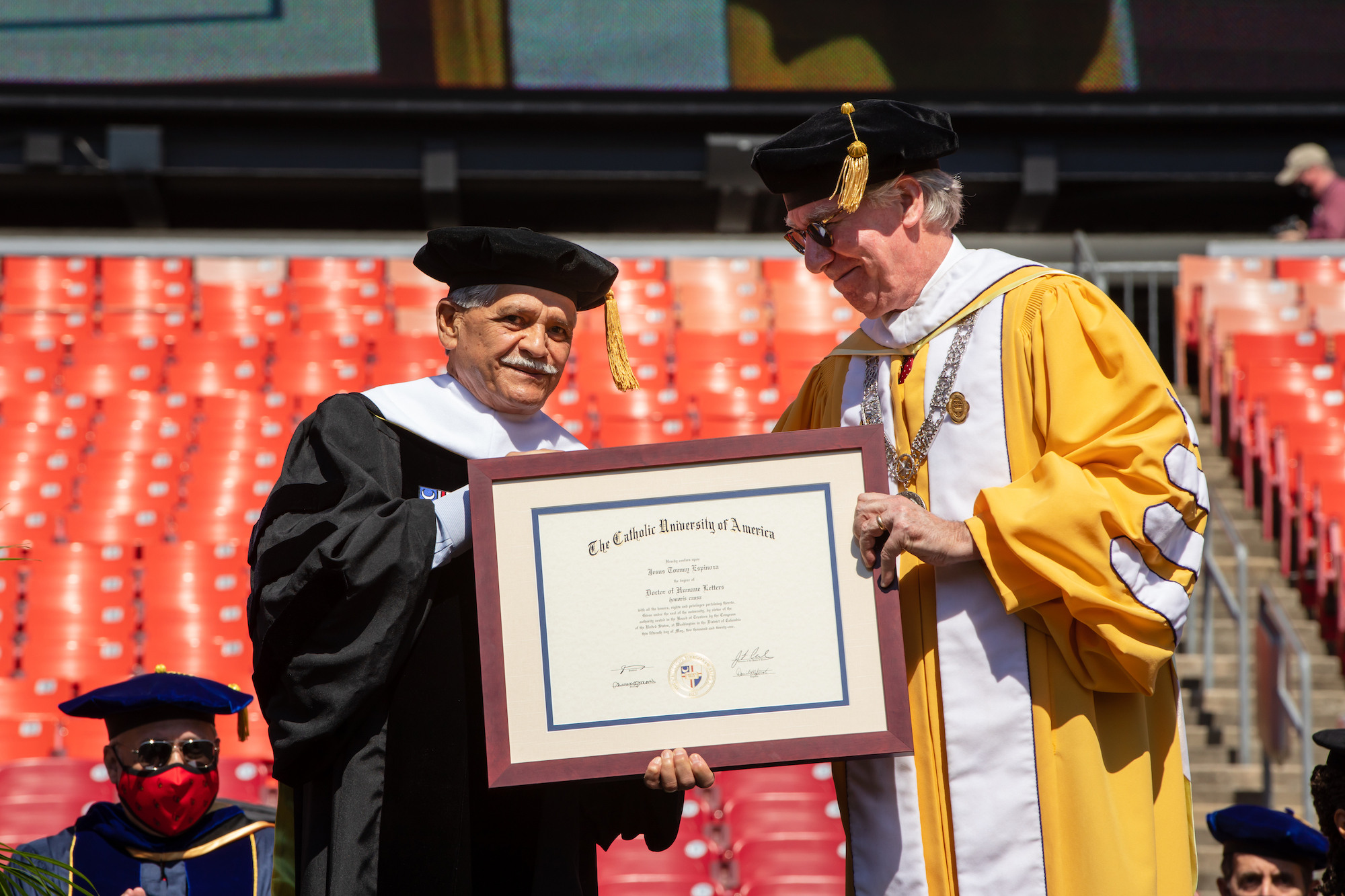
South Phoenix roots
Espinoza grew up in South Phoenix. He attended the now-closed St. Mary Magdalene Church on 12th Street and received his catechism at St. Anthony Parish. He has been attending St. Catherine of Siena Parish for more than 50 years. Although he credits his parents for laying a spiritual foundation for him, Espinoza admits he wasn’t serious about his faith when he was younger.
“My life has not always been walking a real strong spiritual path; I’ve gone off the path a number of times,” he says. “But the one thing that was important is that during that whole period there’s been people that have come into my life.”
In the 1970s, Espinoza became involved with and led Chicanos por la Causa, an organization founded to confront discrimination against Mexican-American students in Phoenix. Although registered as a Democrat, Espinoza was more interested in helping the community than in partisan politics. He recalls going to Washington, D.C., to meet with Democratic Congressman and one-time presidential candidate Mo Udall from Tucson, who asked him “Are you here representing your community, or are you here representing the Democrats?” Espinoza responded he represented the community.
“Good,” Udall replied, “we don’t really care about whether you’re a Democrat or Republican as long as you’re trying to do good for your community.” He then introduced Espinoza to Republican Congressman John J. Rhodes representing Maricopa County, who helped Espinoza obtain the grant for CPLC.
Espinoza would go on to serve as a member of the Mexican American Advisory Council for President Jimmy Carter. He also formed relationships across the political aisle, famously befriending the late U.S. Senator John McCain, and even co-chairing his first senatorial campaign.
‘How do I heal my family?’
Still, Espinoza admits his spiritual life was lacking. “I would go to church, but realistically, that was not my priority in life,” he said.
Guadalupe Huerta, one of his mentors who served on the CPLC board of directors, was a devout Catholic and would bring him daily prayer booklets and rosaries. “I would put them in the box,” he said. “She would bring them. I didn’t really pay that much attention to it.”
But, as time went on, Espinoza went through some “personal crash-and-burns,” that saw his first marriage fall apart. A second marriage, outside of the Church, also fell apart. After promising Huerta for years that he would take her to Medjugorje, “one day, she called me on it.” Although he recognizes that the apparitions at Medjugorje are not formally approved by the Church, the pilgrimage changed his life. He went on to attend a Cursillo retreat and grew closer to God.
“I came back a different person. My kids will tell you that the father they had before, this spiritually grounded father came back, and I had everybody doing the Rosary, going on their knees,” he recalls. “When I was on fire, I had everybody praying, and as time went on, they ended up being part of my spiritual conversion. I was always a Catholic and devout in the sense that I thought I was devout, but I wasn’t really living the full fruits of our faith.”
As he continued to grow in his faith, Espinoza recalls praying in the Basilica of the National Shrine of the Immaculate Conception when he felt a voice telling him to, “Heal your family.” With his first marriage ended in annulment, and the mother of his children remarried, he wasn’t sure how to accomplish this.
“I had been praying, trying to determine, ‘How do I heal my family?’ And it finally dawned on me,” he said. “After praying and meditating with Blessed Mother, I asked for forgiveness.” He gathered his children and their mother together and apologized for not being present for them. “That began a beautiful healing of my family.”
That act affirmed in Eleanor, his first wife, “that she hadn’t done anything wrong,” and in his children “that their father loved them.” Eventually, he met his current wife, Elvira, a convert to Catholicism, whom he’d marry in the Church.
“Tom can be sitting there with bankers and senators and cardinals, and at the same time go into the barrio and sit at a restaurant and talk to the folks from the hood.”
Going through a conversion around the same time was his “spiritual brother,” Armando Ruiz, who had served in Arizona’s House of Representatives and Senate. The two first met when Ruiz was seeking the CPLC’s leader support as he was making his first run for the legislature.
“Tom can be sitting there with bankers and senators and cardinals, and at the same time go into the barrio and sit at a restaurant and talk to the folks from the hood,” Ruiz said. “You sit with him someplace, and the folks from the barrio say, ‘Órale, Tommy, ¿qué tal?’ (‘Hey, Tommy, what’s up?’) And he just came out of talking to the governor. Few people can walk easily and comfortably in both worlds, and he’s able to do that.”
The two would become political allies, then friends, then “brothers” who would take pilgrimages to the Vatican and Lourdes together. Ruiz, who also serves as the CEO of the Espiritu Community Development Corporation, which comprises of three charter schools serving predominantly low-income populations, recalls leaning on Espinoza when trying to get support for the corporation in Washington.
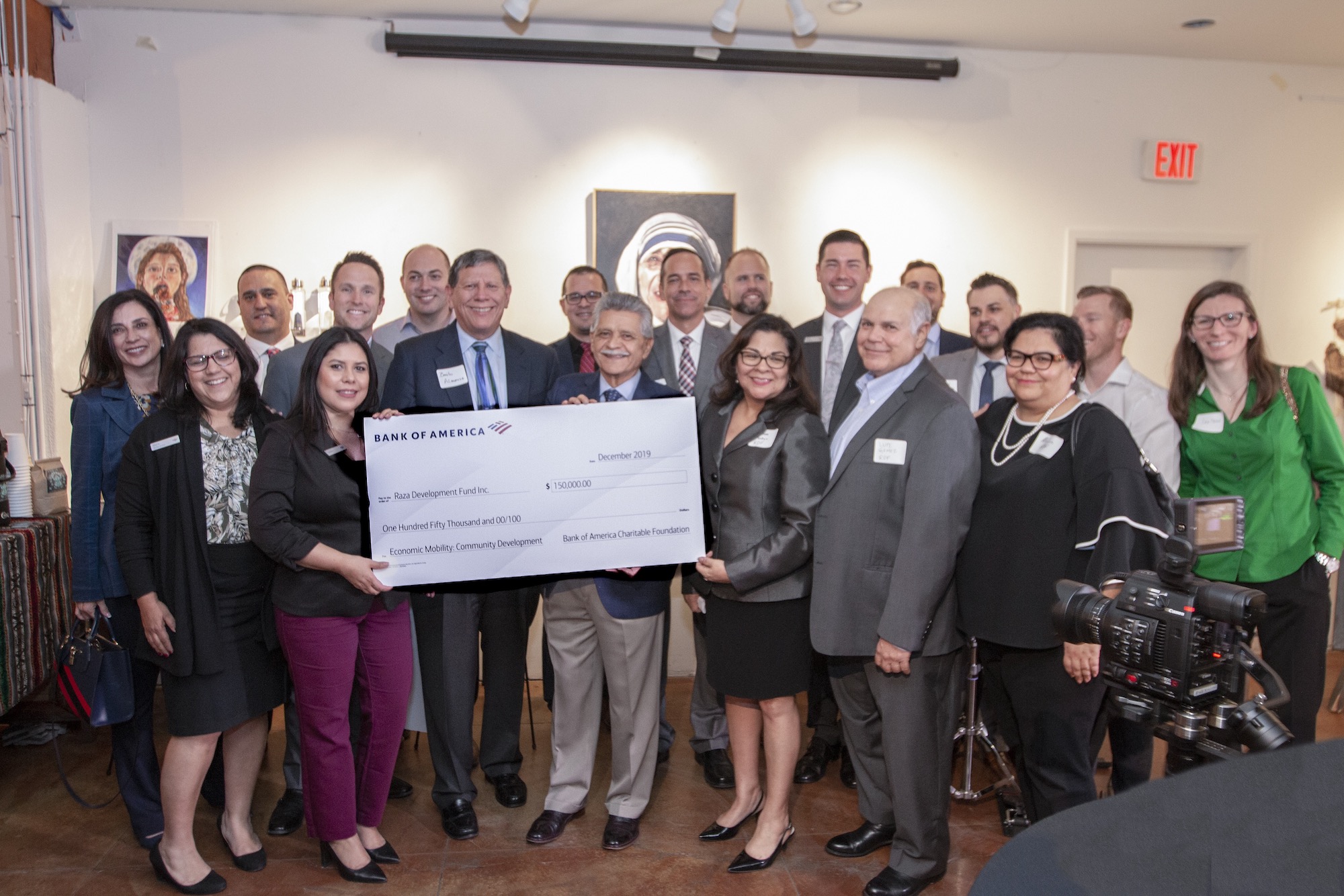

Originally called the “Holy Spirit Corporation,” nobody would meet with them because of the name. One friend advised that they wouldn’t get anywhere because of the religious overtones, and advised they find a new name. “So, we just flipped it to Spanish — Espiritu,” Espinoza said. “That’s how the name came about, Espiritu Community Development Corporation.”
“Anyone who’s going to be a leader that deals with elected officials, that deals with business leaders, you’re going to have to have two parts: you’re going to have to be daring and audacious, and at the same time you’re going to have to support each other when the world knocks down your ideas,” Ruiz said. “I think that’s what Tom always opened the door for us into that world, and he was also a great support when our ideas were knocked down and castigated by those in power.”
Espinoza also recalls Ruiz’s mother, Estela, telling him that he would one day become the “banker for the Blessed Mother.” That happened in 1998, he says, when Raul Yzaguirre, then president of the National Council of La Raza, asked him to put together an economic and community development strategy for the council, which would turn into the Raza Development Fund.
“I remember clearly telling Raul, ‘Look, the Tommy Espinoza you knew before, I’ve changed. If I can’t live my faith, then I can’t take a job,” Espinoza recalled. “He said that is not a concern. He just didn’t want me to proselytize his staff.”
In order to keep his faith intact, Espinoza started wearing crosses as a daily reminder of who he was working for. As he started putting the fund together, he researched how St. Mother Teresa organized her ministry, which worked to build the community “from the poorest up.” He also took cues from St. John Paul II’s Ecclesia in America as a “road map” for what needs to happen in the Americas.
“Tommy’s faith is important to him in his personal life,” said Dr. Aaron Dominguez, provost and senior vice president for CUA. “When making decisions for the RDF corporation, while it’s not a Catholic organization, all of their decisions are guided by their understanding of Catholic Social Teaching, and I’ve never seen anything they do that’s not 100 percent in accord with that.”
When explaining how the university awards honorary doctorates, Dominguez said CUA solicits nominations, and received several for Espinoza. Candidates have to be an example of upholding the school’s Catholic mission and have made an impact on the national or international level, he said, “and that’s what Tommy has done.”
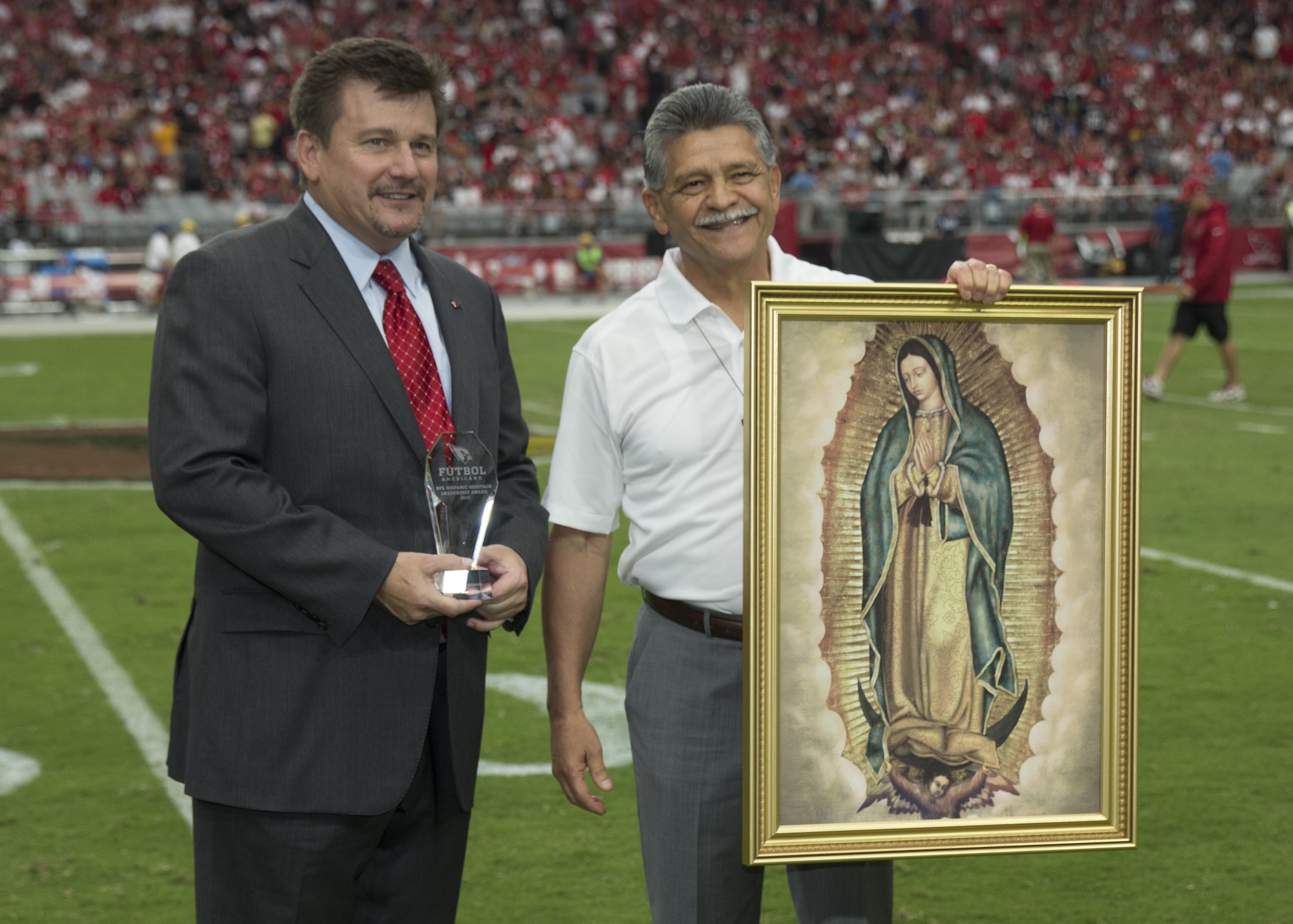

Devoted to la Virgen de Guadalupe
Shortly after being installed as bishop in December 2003, Bishop Thomas J. Olmsted met Espinoza, and asked him to serve on a task force on immigration. Out of that initiative came the annual Honor Your Mother celebration for Our Lady of Guadalupe, the Diocese of Phoenix’s patroness.
“He recommended the need as a Church to have a Catholic response — not just a political response — to immigration,” recalls Bishop Olmsted. “Though we recognize there’s a political dimension that’s important, our first responsibility should be to have a Catholic response to ask for intercession from Our Lady of Guadalupe for all of our immigrants and for all of us who are facing this issue.”
Espinoza’s devotion to Our Lady of Guadalupe is evident in his home, which Bishop Olmsted notes is filled with statues and images depicting the Virgencita Mestiza. Diocesan Chancellor Dr. Maria Chavira noticed that devotion right away.
“We may be in different circles, but like how a mother unites her children, that’s how he sees our Blessed Mother,” Chavira said. “His devotion that he’s had to her has always been something that I’ve admired.”
If not for the “Virgencita of Guadalupe and our Lord Jesus Christ,” Espinoza says, he couldn’t be where he is today.
“The beauty of the Church is that we’re made up of every conceivable ethnic group in the world. Each group has certain cultural identities that are important. The Virgen de Guadalupe is a perfect example of coming to Mexico when the Spaniards were there and pulling those two cultures together,” reflects Espinoza.
“Anybody that does a little history reading on the Virgen of Guadalupe realizes that she came at the moment where the natives were getting killed by the Spaniards, and the Spaniards were abusing the workers, and the workers were also killing the Spaniards. So you had the worst-case scenario, and she came and pulled all that together.”
“He’s a successful business leader, and leadership is something that he has exemplified himself and been interested in fostering in others, especially Catholic Latinos.”
Bishop Olmsted called on Espinoza again a few years later, when he invited the latter to join him in a gathering of Latino business leaders from around the country in Colorado, along with Denver’s then-Archbishop Charles J. Chaput, and then-auxiliary Bishop José H. Gomez (now archbishop of Los Angeles and president of the U.S. Conference of Catholic Bishops).
“He’s a successful business leader, and leadership is something that he has exemplified himself and been interested in fostering in others, especially Catholic Latinos,” the bishop told The Catholic Sun. “He understood the need to have leaders in the Church and to have special support for Latino leaders because the numbers of Latinos were growing. He also saw the need for the leaders to be well-formed in their Catholic faith, and at the same time to be really accomplished professionals, whose expertise was above reproach. They brought their professional abilities as well as their faith together.”
That gathering led to the formation of CALL, or the Catholic Association of Latino Leaders, dedicated to the growth and spiritual formation of Latino leaders of the U.S. in their knowledge and understanding of the Catholic faith.
“We concluded that one of the things that was missing for individuals like myself, and other professionals was a place where we could just put aside the business, and just focus on building our families and ourselves spiritually,” Espinoza recalled. “The idea was to have some of the best speakers we could find to come in at least once a year and have a conference where we would come in and get fed spiritually as professionals.”
Local CALL chapters would also work to support their local ordinaries, as necessary. In Phoenix, that meant bringing to fruition Bishop Olmsted’s desire for a Spanish-language Catholic radio station. With the effort of chapter members and financial support from Espinoza’s Raza Development Fund, 740 AM En Familia Radio was born.
Espinoza would also go on to serve as one of the founding board members for the Tepeyac Leadership Initiative, a program that began in the Diocese of Phoenix to develop Catholic leaders in civil society. Espinoza has served as a speaker for several sessions and continues to serve as a mentor to many who go through the program.
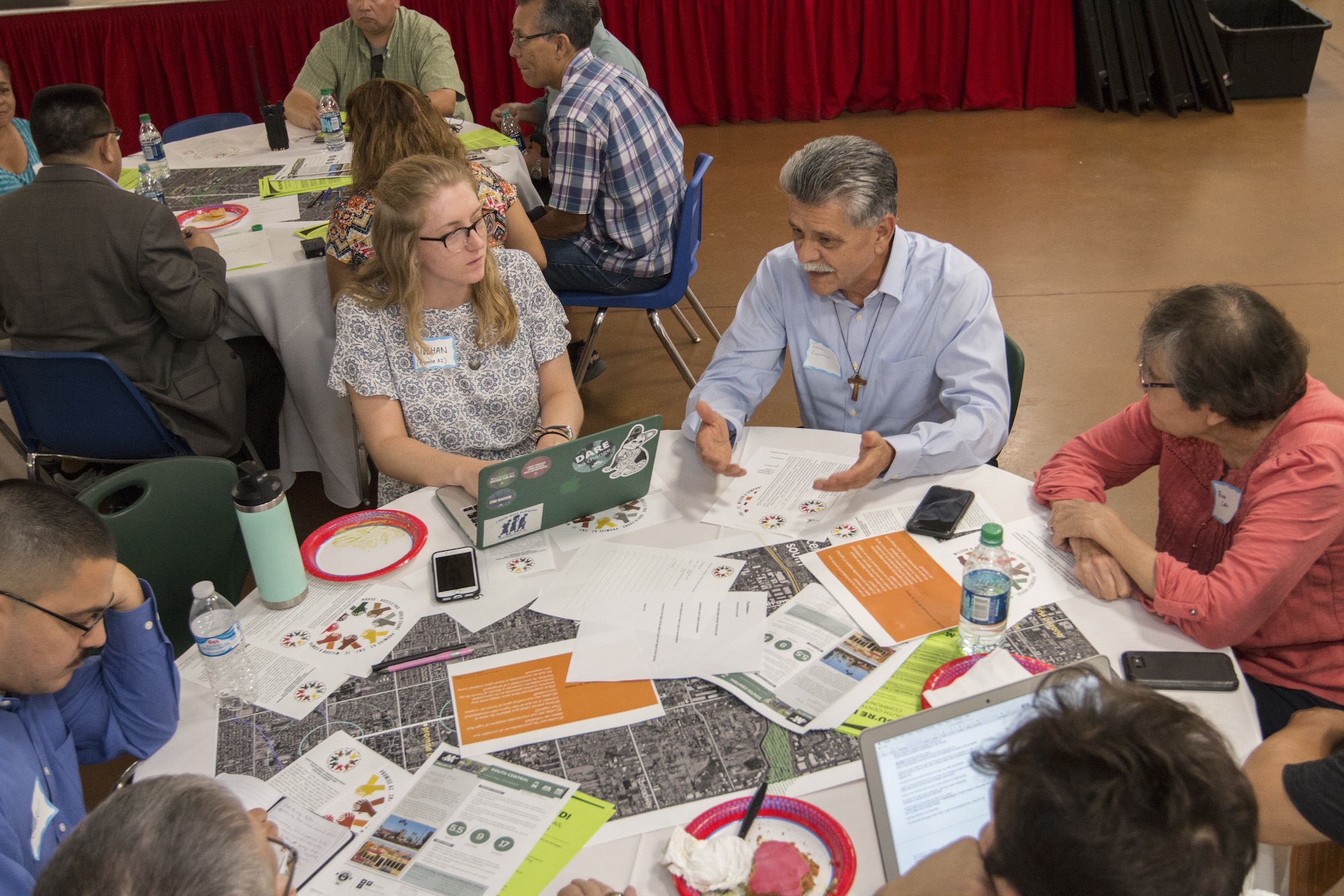

“Tommy Espinoza is what we’re trying to make more of. He embodies what we’re trying to make more of with our leadership, and that’s why many of our program participants look up to him,” said Tepeyac CEO Cristofer Pereyra.
“We’re trying to make more faithful, committed Catholic leaders, but not Catholic leaders for the parish or diocese, though those are good places to lead,” he added. “We’re trying to make more Catholic leaders for civil society, and that’s what Tommy’s been.”
“There’s these challenges that we all go through. Life is not a straight road; life is jags and rocks and valleys and challenges of falling off the faith and then coming back.”
Chavira, the diocesan chancellor, noted that Espinoza is a role model, and the recent awarding of his doctorate can inspire other Catholics in the diocese, especially for the majority Hispanic population.
“When they see stories of individuals that come from their diocese or their home or their families, they have role models they can look up to and be inspired by how it is that one will live their life with their Catholic faith being an important, integral part of that in the public square,” Chavira said.
“Tommy is not ashamed of his faith. Everyone knows who he is and what it is that he stands for, and yet he’s able to dialogue with others, working towards the common good for our community, and that is really important.”
For Espinoza, his achievements are a result of a solid foundation given to him by his parents.
“My dad and mom bringing our Catholic faith to me and allowing me to learn as I went, as imperfect as it may have been, is what was the foundation of whatever fruits that I’ve been able to produce in my life,” Espinoza said.
“There’s these challenges that we all go through. Life is not a straight road; life is jags and rocks and valleys and challenges of falling off the faith and then coming back,” he added. “You just hope that every time you come back, you’re stronger from the experiences that you’ve lived through.”



